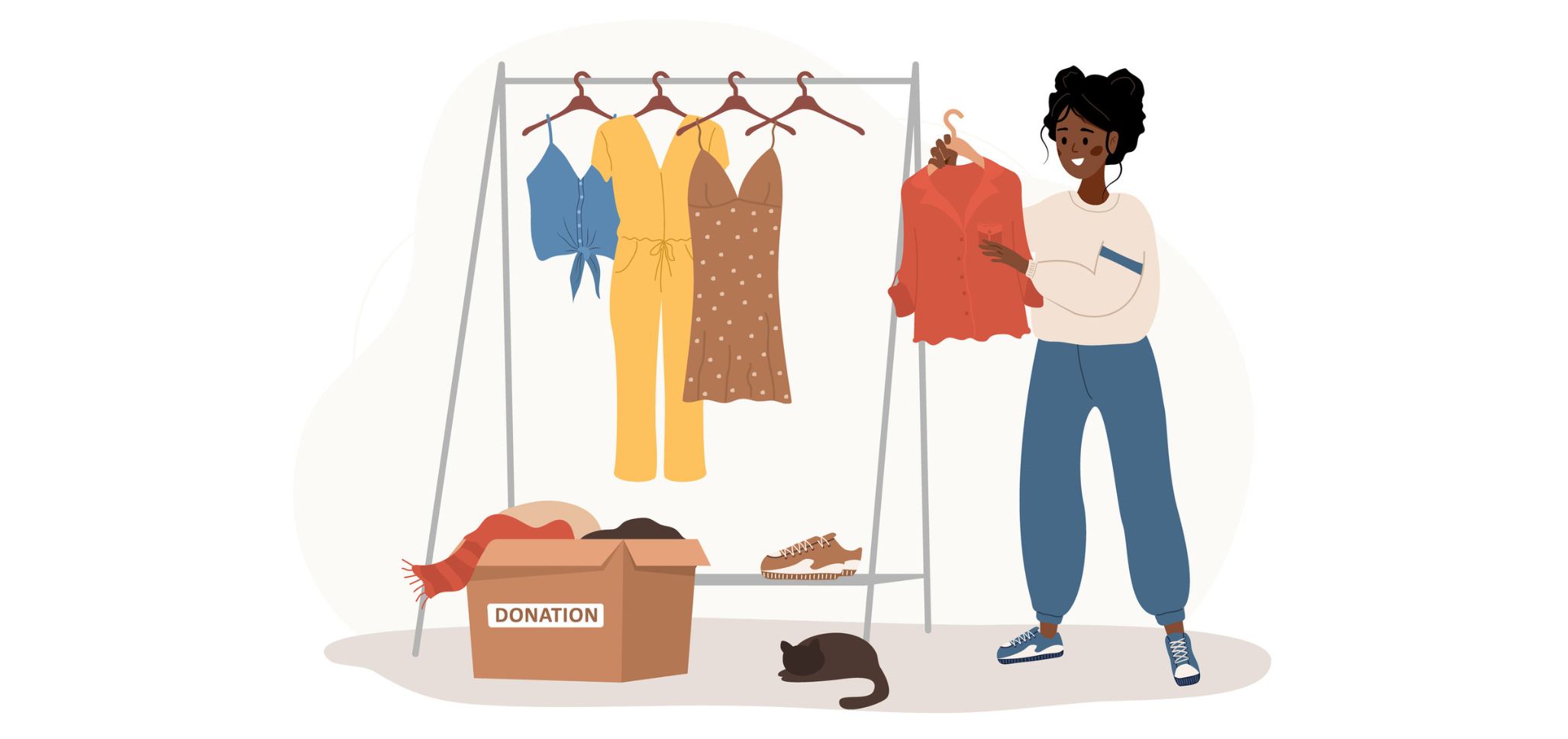
The Best Way to Store Bulky Clothes in a Small Closet

By Lilly Milman
Nov 28, 2023
One of the common downsides of apartment living is a lack of closet space — and in the winter, when you start regularly pulling out your thick wool sweaters and puffer jackets, the problem can go from bad to worse. Clutter can build up quickly, leaving you feeling like you have less room for clothing storage than ever. So, what do you do if you have a small closet but a sizable sweater collection? How can you maximize the space that you do have?
We spoke with professional organizers to learn their closet organization hacks for storing bulky clothes in small apartments.
If You Aren’t Using It, Vacuum Seal It
The first step to an organized closet is removing what you don’t need. Each season, save space by removing seasonal items that you will no longer be wearing from your closet and vacuum sealing them for easy storage. For example, when winter hits, you will want to remove any out-of-season clothes like shorts, T-shirts, sundresses, etc., seal them in a storage bag, and store them elsewhere — whether it’s in a basement (if you have access to one) or a bin under your bed. Another benefit of storing unused clothes this way is that it protects them from dust and moisture during the off-season, says Dallas, TX–based professional organizer Aaron Traub. This hack is a bit labor intensive but will make the rest of your organizing journey much, much easier.
Think Outside Your Closet
When creating smart storage solutions, don’t forget to think outside the small box of your closet space. Raychel Klein, a Seattle, WA–based home organizer, recommends hanging hooks on bedroom or closet doors or mounting a leaning ladder to stack folded clothing on as potential ways for adding extra storage space to your room. Buying storage bins that easily slide under your furniture, like your couch or bed, can also be a big help for storing clothes you don’t necessarily want to vacuum seal, but that you don’t reach for every day. IKEA and Amazon both sell affordable wide but short bins especially made to be under-bed storage containers.
Learn to Fold Efficiently
Did you know that some folding methods are significantly more efficient than others? Famed Japanese organizer Marie Kondo’s KonMari method is just one example. If you fold your clothes using her step-by-step tutorial, then you should be able to stand up each item on its side on a shelf, like a book on a bookshelf. This uses shelf space more efficiently than stacking clothes on top of each other and makes them more convenient to grab out of your closet (since you won’t risk toppling over a big pile of sweaters every time you reach for one on the bottom).
Add Shelving When Necessary
We all dream of having a walk-in closet with lots of built-in closet storage and shelving, but if you live in a studio or small apartment, you may be dealing with a home organizer’s worst nightmare: Your sole closet is essentially just a shallow cutout in the wall with a hanging rod across it. If you are, understandably, struggling to store your clothes in this tiny closet, then it’s time to bring in some reinforcements. Adding your own shelving, even if it’s just one long shelf across the top above the rod, can be a game changer (plus, it can be pretty easy to DIY). This will allow you to use the hanging space for most of your clothes but store especially bulky pieces or purses and handbags on the top shelf — either folded or in bins. A shoe rack and stackable drawers can also help you use the full vertical space of your closet, says Lina DaSilva, an organizer based in Toronto, Canada.
Keep Only What You Love
One of the most difficult steps to truly decluttering is downsizing. If you simply never feel like you have enough space, even after trying all of the above hacks to organize a small closet, then it may be time to get rid of some things. Most people are holding onto a lot of clothing items that they no longer wear, which can make storage tricky, especially in a small bedroom. In an article on decluttering and organization tips for ApartmentAdvisor, Portland, OR–based professional decluttering consultant Julia Williamson suggests that readers “use the two-year rule” when deciding what to keep and what to donate: “If the last time you wore something was over two years ago, there’s very little chance you’ll wear it again.”
Top cities
Atlanta Apartments
1,999 apartments starting at $600/month
Austin Apartments
4,949 apartments starting at $600/month
Baltimore Apartments
1,472 apartments starting at $500/month
Boston Apartments
3,499 apartments starting at $940/month
Charlotte Apartments
2,903 apartments starting at $450/month
Chicago Apartments
4,012 apartments starting at $450/month
Dallas Apartments
5,609 apartments starting at $604/month
Fort Worth Apartments
2,193 apartments starting at $600/month
Houston Apartments
4,504 apartments starting at $590/month
Las Vegas Apartments
1,081 apartments starting at $704/month
Los Angeles Apartments
11,535 apartments starting at $625/month
Miami Apartments
544 apartments starting at $1,000/month
Milwaukee Apartments
928 apartments starting at $465/month
New York Apartments
4,118 apartments starting at $488/month
Oakland Apartments
608 apartments starting at $885/month
Orlando Apartments
842 apartments starting at $825/month
Philadelphia Apartments
3,657 apartments starting at $550/month
Phoenix Apartments
4,153 apartments starting at $599/month
Pittsburgh Apartments
1,223 apartments starting at $600/month
Portland Apartments
2,519 apartments starting at $599/month
Raleigh Apartments
1,367 apartments starting at $750/month
San Antonio Apartments
3,925 apartments starting at $525/month
San Diego Apartments
2,960 apartments starting at $650/month
San Francisco Apartments
436 apartments starting at $675/month
San Jose Apartments
405 apartments starting at $1,300/month
Seattle Apartments
3,623 apartments starting at $450/month
Tampa Apartments
1,078 apartments starting at $800/month
Washington DC Apartments
2,878 apartments starting at $745/month


